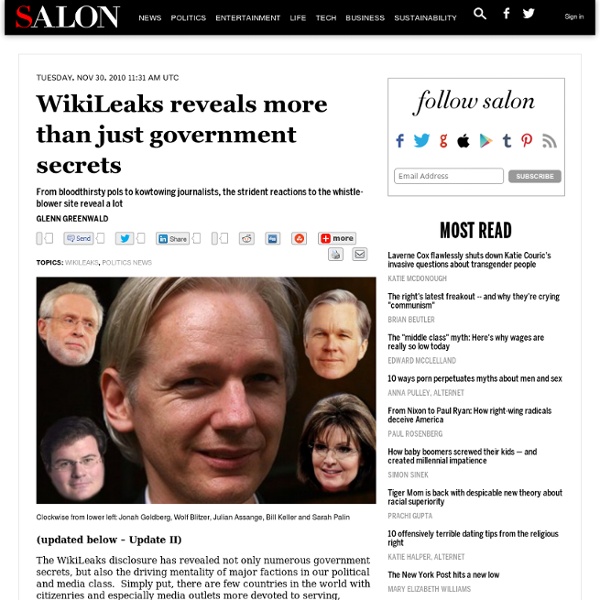Ron Paul: Re: Wikileaks- In a free s...
Wikileaks' struggle to stay online
7 December 2010Last updated at 19:51 By Jane Wakefield Technology reporter Julian Assange has now been arrested For rolling news outlets Wikileaks has been a dream come true with thousands of US embassy cables dribbling out titbits of sensitive information and providing new headlines on a daily and even hourly basis. But for the US government, the revelations are less welcome. The site has become its bete noire and after making its displeasure clear, US firms that have dealings with it have been quick to turn their backs. The troubles began for Wikileaks when Amazon which hosted its servers in the US, withdrew services saying the site was breaking its terms and conditions. They continued when EveryDNS, the domain name firm which allowed the Wikileaks.org address to be translated into an IP address, withdrew services. Without it, the .org site was effectively shut down. But despite losing many links in its supply chain, Wikileaks remains defiantly online. Continue reading the main story
WikiLeaks: WikiLeaks,org domain kille...
WikiLeaks fights to stay online after US company withdraws domain name | Media
The US was today accused of opening up a dramatic new front against WikiLeaks, effectively "killing" its web address just days after Amazon pulled the site from its servers following political pressure. The whistleblowers' website went offline for the third time in a week this morning, in the biggest threat to its online presence yet. Joe Lieberman, chairman of the Senate's committee on homeland security, earlier this week called for any organisation helping sustain WikiLeaks to "immediately terminate" its relationship with them. On Friday morning, WikiLeaks and the cache of secret diplomatic documents that have proved to be a scourge for governments around the world were only accessible through a string of digits known as a DNS address. The site later re-emerged with a Swiss domain, WikiLeaks.ch. Julian Assange this morning said the development is an example of the "privatisation of state censorship" in the US and is a "serious problem." Amazon said: It noted that:
WikiLeaks website pulled by Amazon after US political pressure | Media
The US struck its first blow against WikiLeaks after Amazon.com pulled the plug on hosting the whistleblowing website in reaction to heavy political pressure. The company announced it was cutting WikiLeaks off yesterday only 24 hours after being contacted by the staff of Joe Lieberman, chairman of the Senate's committee on homeland security. WikiLeaks expressed disappointment with Amazon, and insisted it was a breach of freedom of speech as enshrined in the US constitution's first amendment. While freedom of speech is a sensitive issue in the US, scope for a full-blown row is limited, given that Democrats and Republicans will largely applaud Amazon's move. The question is whether he was acting on his own or pressed to do so by the Obama administration, and how much pressure was applied to Amazon. The WikiLeaks main website and a sub-site devoted to the diplomatic documents were unavailable from the US and Europe yesterday, as Amazon servers refused to acknowledge requests for data.
Twitter Appears to Censor Wikileaks-Related Trends
I'm (was?) a Twitter user. This past week I found it utterly weird that none of the words #wikileaks, #cablegate, #cables, #Assange were actually "trending". I even tweeted about this 5 days ago. Wikileaks-related terms did not really trend almost at all last week. Now, I'd probably could give them the benefit of the doubt, but seeing how Twitter suspended their own scheduled server maintenance last year in order to not interrupt its users from tweeting on Iran's protests, for me, this is a good indication about how one-sided, and political, their motivations could be in nature. Like Digg.com, Twitter became what it is today because it made its users believe that they're part of an internet force that embodied democracy on the way information is becoming popular.
Blocking Access to Wikileaks May Harm CRS, Analysts Say
The Library of Congress confirmed on Friday that it had blocked access from all Library computers to the Wikileaks web site in order to prevent unauthorized downloading of classified records such as those in the large cache of diplomatic cables that Wikileaks began to publish on November 28. Since the Congressional Research Service is a component of the Library, this means that CRS researchers will be unable to access or to cite the leaked materials in their research reports to Congress. Several current and former CRS analysts expressed perplexity and dismay about the move, and they said it could undermine the institution’s research activities. “It’s a difficult situation,” said one CRS analyst. “I can understand LOC blocking the public’s access to Wikileaks,” a former CRS analyst said. In fact, if CRS is “Congress’s brain,” then the new access restrictions could mean a partial lobotomy. Another former analyst questioned the legal basis for the Library of Congress’s action.
WikiLeaks founder Assange has encrypted Guantanamo documents, will release them if arrested
WikiLeaks founder Julian Assange has circulated across the internet an encrypted “poison pill” cache of uncensored documents suspected to include files on BP and Guantanamo Bay. One of the files identified this weekend by The (London) Sunday Times — called the “insurance” file — has been downloaded from the WikiLeaks website by tens of thousands of supporters, from America to Australia. Assange warns that any government that tries to curtail his activities risks triggering a new deluge of state and commercial secrets. The military papers on Guantanamo Bay, yet to be published, believed to have been supplied by Bradley Manning, who was arrested in May. Other documents that Assange is confirmed to possess include an aerial video of a US airstrike in Afghanistan that killed civilians, BP files and Bank of America documents. One of the key files available for download — named insurance.aes256 — appears to be encrypted with a 256-digit key.



